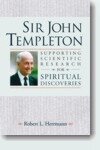| Thoughts are things. —Charles Fillmore |

Articles: Sir John TempletonThe World's Greatest Investors Sir John Templeton BORN ON THE EVE OF World War I, Sir John Templeton was a Yale undergraduate during the Depression and a Wall Street rookie in the runup to World War II. He's seen his share of tough times. That's why, when he told SmartMoney last year that "there are fewer opportunities than I've ever seen in 91 years," we sat up and took notice. Templeton never had much trouble spotting opportunity. He hunted down global bargains long before jet travel got off the ground and invested in U.S. companies at the start of World War II. The most important lesson we can learn from Templeton is to go against the grain. An über-contrarian, he didn't just bet against the crowd — he liked to invest at "the point of maximum pessimism." The results don't say much for the crowd. An investor who put $10,000 in his flagship Templeton Growth fund at its launch in 1954 would have nearly $7 million today. His outlook remains negative. "Prices of almost all publicly traded stocks are now too high in relation to probable long-term earnings per share, especially in the U.S.A.," he recently wrote in response to our questions. He advises investors to keep no more than half of their portfolio in stocks. "Bond prices also continue to be too high," he says, "especially the prices of lower-quality bonds." That doesn't mean he's out of ideas. He's a fan of market-neutral funds, which keep a roughly equal weighting in long and short positions and let investors profit from the wisdom of the manager. And as always, he sees value overseas. Investors should "invest in a well-managed mutual fund focusing on nations and industries where share prices are not so high," he says. He likes the Matthews Asia-Pacific fund, which invests more broadly across Asia than most of the funds that focus on the region. Templeton's tip for bond investors: Focus on countries that have both trade and budget surpluses. Russia and Canada fit the bill. Though Templeton has been putting his own money in hedge funds, their explosive growth gives him qualms. He argues that "very few hedge funds will be able to cover their very high operating costs. Because many hedge funds work with borrowed money, it is quite possible that many will become bankrupt within the next year or two and the liquidation of those bankrupt funds will depress share prices." Depressed share prices? That will mean it's time to load up on stocks. As Templeton put it shortly before the turn of the millennium, "In this century or the next, it's still buy low, sell high." Hedge funds and overheated markets aren't the only issues troubling Templeton. When asked about his view on the Social Security debate, he points out that Medicare's excess obligations are a more pressing problem. Even so, "evidence is increasing that eventually, the age at which Social Security will begin to pay pensions will need to be advanced at least as rapidly as the average annual increase in life expectancy," Templeton says. "Competition," he adds, "is always a strong force for better results and therefore assets of pension funds are likely to prosper more if not controlled by governments but are invested in 10 or more privately managed custody accounts approved by a board selected by the government." Templeton, of course, doesn't watch the mailbox for pension checks. His foundation, which focuses on spiritual and scientific research, gives away about $40 million a year. Given his interest in values and theology, we wondered if Templeton would weigh in on socially responsible and faith-based investments. "It seems wise to search for bargains among shares of companies whose activities are rapidly growing because they are beneficial," Templeton says, "more than trying to decide which are 'socially responsible' or 'faith based.'" |
Biography || Obituary || Chronology || Prize Winners || Quotes
Photographs || Articles || Publications || Reference Books || Home
Templeton Press was created & designed by Genesis Computing, Inc.
The graphics used are optimized for 800x600 and 24-bit True Color.
Website hosting provided by Genesis Computing, Inc.


